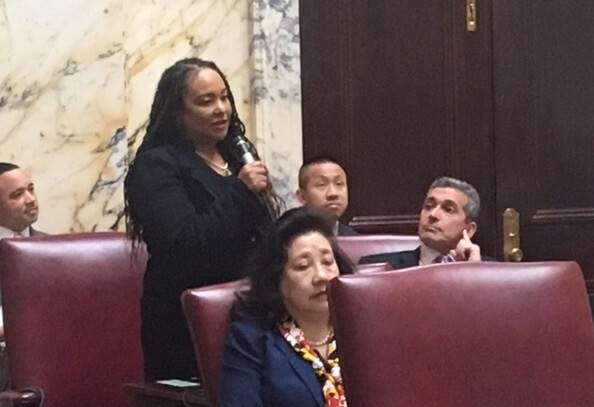
Maryland’s 7th congressional district was born out of civil rights activism and Black progressivism.
Parren J. Mitchell of the legendary Baltimore family won the seat in 1970, beating nine-term incumbent Sam Friedel by a mere 38 votes in the Democratic primary, following an unsuccessful attempt in 1968. This prompted Friedel to threaten a congressional investigation on “voting irregularities” – simply because he did not believe that Black folks were smart enough to organize a campaign to defeat him, even though half of the electorate was Black.
Mitchell was one of the founders of the Congressional Black Caucus, who boycotted President Nixon’s State of the Union address because Nixon refused to meet with them. He fought for affirmative action legislation and included minority contractors in 10% of a $4 billion public works project. Kweisi Mfume, who replaced Mitchell after he retired from Congress in 1986, fought for federal funding for cities following President Reagan’s budget cuts. He later became the chairman of the CBC and left Congress to become the president of the NAACP.
Elijah Cummings stood up for civil rights from an early age. At 11, he was attacked by a white mob as he integrated a swimming pool in South Baltimore and over 1,000 white folks protested against him, with signs saying, “Keep Our Pool Germ Free” and “White People Have Rights Too.” He bore lifelong scars from objects thrown at him during this ordeal.
Cummings’ fighting spirit endured as he supported postal workers, gay Americans, and many others throughout his political career in Annapolis and Washington. This legacy of civil rights activism and tenacious defense of Baltimore and marginalized Americans must be honored in the next representative from the 7th District.
State Sen. Jill P. Carter (D) has been a fighter on civil rights, like Elijah, since she was a child. And she is maintaining a family legacy.
She is the daughter of Walter P. Carter, the chairman of Baltimore’s Congress of Racial Equality (CORE), which fought housing discrimination, “whites only” public accommodations, and poor living conditions for Black folks in Baltimore and Maryland through sit-ins, boycotts, demonstrations, freedom rides, and pressuring city leadership relentlessly.
Walter Carter was nominated by Mayor Thomas D’Alesandro III to head the Community Action Agency but was strongly opposed by City Council President William Donald Schaefer for being “too radical” and “too militant” and lost the Council vote 8-10, leading Parren Mitchell and two others to resign from positions on the Urban Coalition.
Carter tragically died of a heart attack while leading a meeting in Union Baptist Church on July 31, 1971, the day after he won a court battle against real estate tycoon Morris Goldseker. He stands alongside other Maryland figures of civil rights activism such as Gloria Richardson, Frederick Douglass, Harriet Tubman, and Arthur King.
Jill Carter grew up in Ashburton, a Black suburb within the city that she recalls as idyllic. This did not deter her from being actively involved in the struggle for human rights. She graduated from Western High School and there is now a mural on the campus in her honor.
She went to Loyola and got a Bachelor’s in English, then a JD from the University of Baltimore School of Law. Following this, she worked as a reporter with the Afro-American newspaper. She has represented several thousand individuals as a lawyer and hundreds as a public defender across the state.

Richard DeShay Elliott
In 2002, Carter was elected to the House of Delegates with a grass-roots campaign in Northwest Baltimore. She won with 8,958 votes, the highest vote-getter in that district. For two terms, she was the only female Black lawyer serving in the House. Through her work on the Judiciary Committee, she frequently clashed with House Speaker Michael Busch and Judiciary Chairman Joe Vallario.
But she was still effective. In her first session, she was a sponsor of legislation to change the Baltimore election dates to be lined up with the presidential race (which did not take effect until 2016), to protect tenants from lead poisoning, to put a moratorium on the death penalty, and to expand state grants and planning under the Bridge to Excellence in Education Act to include infants and toddlers.
She has passed bills to require public information on the use of restrictive housing in prisons, expand expungement and require notifications from courts that expungement is available to defendants, implement best practices in homeless shelters, address the lead poisoning crisis, improve search methods for missing youth, and increase police oversight and expand training on use of force, cultural diversity, and lifesaving skills.
Carter voted against slot machine legalization in 2005. She has the strongest and longest history of civil rights legislation in Annapolis, unquestionably.
She was one of the few to stand against Martin O’Malley as his mayoral administration embraced zero tolerance and mass arrests of Black folks in the city. These tactics resulted in over 100,000 arrests in back to back years, throwing many innocent people in jail and stripping them of dignity, jobs, housing, and access to their families. She was one of the few Democrats in Annapolis who fought Governor O’Malley’s $14 million youth jail, aligning with Leaders for a Beautiful Struggle and the Rev. Heber Brown, among others.
In 2017, she resigned from the House of Delegates to head the Baltimore Office of Civil Rights and Wage Enforcement.
In 2018, Jill was appointed to the state Senate following the resignation of Sen. Nathaniel Oaks in a corruption sting. In the subsequent Democratic primary, the son-in-law of former Governor O’Malley launched a website to attack Carter on her voting record without acknowledging the depths of bullying and marginalization she faced in the legislature during O’Malley’s tenure.
His campaign had significantly more fundraising, despite a wide credibility gap: Jill had been a Delegate for over a decade, her opponent had been a school teacher for a few years. Oaks’ name was left on the ballot, undoubtedly to split the Black vote. Despite the institutional advantages for her opponent and hurdles in her way, she won her race by nearly 3,000 votes. She was the top vote-getter of all Baltimore City senators last year.
Last session, Carter passed bills to decriminalize street gambling, lower the fees and end jail sentences for driving with a suspended license, require reporting of race-based traffic stops, allow returning citizens to participate on juries, require interviews before background checks in the hiring process, and require the Governor’s Office of Crime Control and Prevention to study information on certain guns.
The biggest story of the session was her legislation to bring accountability to the University of Maryland Medical System Board. After passing that legislation, Baltimore mayor Catherine Pugh was forced to resign as her UMMS deals were revealed and the entire UMMS board was replaced as others who had been profiteering off Maryland were forced out. In her freshman year as a senator, she was touted as one of the most effective legislators by Maryland Matters, The Baltimore Sun, and The Daily Record.
In her entire legislative career, Carter has been independent of Annapolis political bosses and a national leader in criminal justice reform, government accountability, and civil rights legislation. She’s fought for what’s right, even when she stood alone in a legislative body of 141.
In Congress, she would be a strong advocate for Medicare For All, police oversight, pay equity and anti-discrimination legislation, federal investment into cities and public transportation, a livable wage, peaceful foreign policy, and an end to the national horror of lead poisoning. For these reasons, I believe that Sen. Jill P. Carter is a strong replacement for civil rights icon and Baltimore Congressman Elijah Cummings who will defend the marginalized and attack injustice wherever she sees it and fill a seat that has historically been filled by civil rights activists.
— RICHARD DESHAY ELLIOTT
The writer is a political science Ph.D candidate at Johns Hopkins University, a public policy researcher with Del. Vaughn Stewart (D-Montgomery), and campaign strategist with Tim Adams for mayor of Bowie. You can find him on Twitter at @RichElliottMD and on Facebook. This article does not reflect the opinions of Del. Stewart or his office.




 Creative Commons Attribution
Creative Commons Attribution